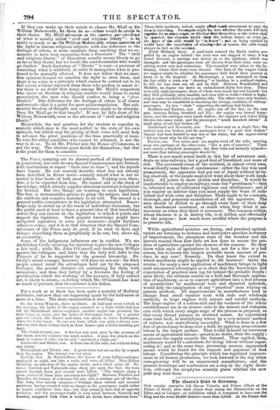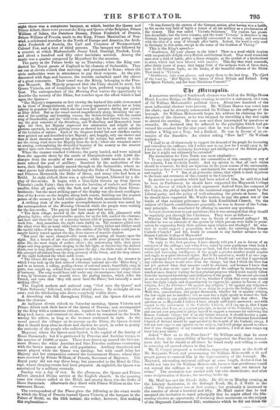Che cauern's VIM to Get - mang.
Ours regular narrative left Queen Victoria and Prince Albert at the Palace of Briihl, after their return from seeing the illumination on the Rhine and at Cologne: an exhibition which is computed to have cost the King and the town 20,000 thalers—more than 3,0001. At the Palace that Night there was a 'sumptuous banquet, at which, besides the Queen and Prince Albert, there were present the King and Queen of the Belgians, Prince William of Solms, the Dutchess Dessau, Prince Frederick of Prussia, Prince William of Prussia, uncle to the King, Prince Maximilian of Neu- wied, a celebrated traveller in the North of Europe and America, the Arch- duke Frederick of Austria, the Earl and Countess of Westmoreland, Colonel Fox, and a host of titled persons. The banquet was followed by a concert, at which Mademoiselle Jenny Lind, Staudigl, Pischek, Liszt, and about a hundred and fifty other musicians assisted. Among the mimic was a quartet composed by Meyerbeer for the occasion. The party at the Palace broke up on Thursday; when the King con- ducted his Royal guests of England to his chateau of Stolzenfels. They set out at eleven o'clock that morning, and proceeded to Bonn; where the civic authorities were in attendance to pay their respects. At the pier, decorated with flags and banners, the tourists embarked amid the cheers of a great concourse. Their vessel was the Konig, belonging to the Prus- sian Monarch. His Majesty proposed that the Fairy should be used ; but Queen Victoria, out of compliment to her host, preferred voyaging in his boat. The correspondent of the Morning Post waives the opportunity to describe the scenery of the Rhine, but touches upon the effect which it had upon the Queen-
" Her Majesty's impression on first viewing the banks of this noble river seemed to be those of disappointment, and the scenery appeared to strike her as being inferior in grandeur to that which she had seen last autumn during her sojourn at Blair Athol. But as the vessel moved magnificently along, breasting the cur- rent of the exulting and bounding stream, the Sieben-Gebirge, with the castled crag of Drachenfels, and the 'wilif rocks shaped as they had turrets been,' crown- ing the gray summits of the Stronberg, and Wolherberg and Hemmerich burst npw the view, her Majesty expressed her admiration and delight at the glorious spectacle, in such glowing terms as showed her to be an ardent admirer of the beauties of nature. Each of the frequent feudal but now chiefless castles were pointed out and described to her Majesty; and, happily, only one shower and that of short duration marred the pleasure of the voyage, but neither the rain nor the strong wind drove her Majesty from the deck; where she remained under an awning, contemplating the diversified beauties of the scenery as the steamer opened upon each succeeding reach of the river."
When the steamer reached Coblentz, the party landed, and were saluted from the opposite shore by the castle of Ehrenbreitstein with 2,500 dis- charges from the mouths of 400 cannon; while 5,000 muskets at Cob- lentz echoed the peal of artillery. Received by the authorities of the town, their Majesties hastily passed through to the Stolzenfels; where se- veral guests had already arrived, including the Duke of Nassau, the Prince and Princess Metternich, the Duke of Hesse, and many who had been at Brtihl. At eight o'clock there was a splendid banquet, followed by a dis- play of fire-works. It began with a blue-light thrown up from Queen Victoria's yacht Fairy; then there was the bursting of rockets and Roman candles from all parts, with the flash and roar of artillery from Ehren- breitstein; but the most striking part of the display was the mock conflagra- tion of the tawers on the heights along both coasts, fetching out the nearest points of the scenery in bold relief against the black mountains behind. A striking trait of the popular accomplishment in music was noted by the correspondent of the Morning Chronicle while the people were waiting for the fire-works. The gayety had been somewhat noisy-
" The little village, nestled in the dark shade of the hill, glimmered with glancing lights; other glowwormlike sparks, far up the hill, marked the chateau; and here and there the ray of a moving lantern told of preparations for the fire- work fete. And, meantime, the night came darkly on. The steamers glided over the silent river like so many white water-snakes, veering hither and thither amid the turbid eddies of the stream. The dim outline of the hilly banks could just be caught faintly traced against the sky, from masses of massive shadow. "But anon the scene changed—the moon rose, pouring all beauty upon the night. Not a breath of air was stirring ; the noble river gleamed in the moon- shine like the most virgin of molten silver ; the embowering hills, their green slopes and deep gorges either sleeping in the fair light, or thrown into the darkest shade, rose in long dimly-seen ridges against the sky ; the white walls of Stolzen- fels emerged all radiant from the deep greenery of the forest, and the deep silence of the night hallowed the whole noble scene.
"The silence did not last long. A deep manly voice on board the steamer in which I was took up the first notes of a German national air—the Rhine Song' ; and in an instant, a rolling, pealing chorus of national music, beautifully sung in parts, was caught up, echoed from steamer to steamer in a massive simple strain Of harmony. The song would have told under any circumstances; but sung where it was, by Germans on the moonlit river, the pealing burden, which defies the French, and vows that 'they will never have the Rhine,' had naturally a most striking effect."
The English anthem and national song, "God save the Queen" and "Rule Britannia," followed, with other choral pieces. By midnight all was over; and the thickening rain drove everybody within doors.
A drenching rain fell throughout Friday, and the Queen did not stir from the chateau.
At half-past eleven o'clock on Saturday morning, Queen Victoria and Prince Albert took their leave of the Queen of Prussia; and, accompanied by the King with a numerous retinue, repaired on board the yacht The King took leave, and returned on shore; where he remained on the beach, waving his adieus, as long as the steamer continued in sight. As the vessel passed the villages on its passage up the Rhine, the Queen desired that it should keep close in-shore and slacken its speed, in order to gratify the curiosity of the people who collected on the banks.
Mayence, where the Queen next landed, is the capital of the duteby of Hesse Darmstadt; but it is garrisoned by Prussian and Austrian troops, to the number of 10,000 or more. These were drawn up around the Govern- ment House; the white Austrian and blue Prussian uniforms contrasting
with the brown masses of the civil population. Artillery thundered and music played while the Queen was landing: but with small delay her Majesty and her companions entered the Government House; where they were received by Prince William of Prussia, Governor of Mayenee. The Royal party did not stay there long; but proceeded to the Hotel de ltu- rope, where sleeping-rooms had been prepared. At nightfall, the Queen was entertained by a military serenade. Sunday was a day of rest. In the afternoon, the Queen and Prince Albert attended Divine service at the English church. In the morning some few visiters called at the Hotel, and among them was the Duke of Hesse Darmstadt. Afterwards they dined with Prince William at the Go- vernment House.
The correspondent of the Times gives the following as the exact words in which the King of Prussia toasted Queen Victoria at the banquet in the Palace of Braid, on the 12th instant: the writer, however, first making this explanation— "It was formerly the custom of the German armies, after having won a battle. to fire on the easy field of battle a round of all the artillery as a proclamation of the victory. This was called 'Victoria Schiessen: The custom has grown into desuetude; but the term remains, and the word Victoria' is therefore in the German language and poetry especially consecrated to victory, and associated with the idea of a song of triumph after battle. Indeed, the word is only used in Germany in this sense, except as the name of the Goddess of Victory."
This is the King's speech-
" Gentlemen, fill your glasses to the brim! There is a word which inspires with unspeakable delight every British and German heart. That word resounded once over a field of battle, after a fierce struggle, as the symbol of a brotherhood in arms, which had been blessed with success. This day that word resounds, after thirty years of peace, that happy fruit of the arduous work of those days, here in the German lands, on the banks, of the beautiful stream of the Rhine. That word is Victoria.'
"Gentlemen, take your glasses, and empty them to the last drop. The object of the toast is, Her Majesty the Queen ot Great Britain and Ireland. Long live Queen Victoria, and her most illustrious Consort ! '"



























 Previous page
Previous page